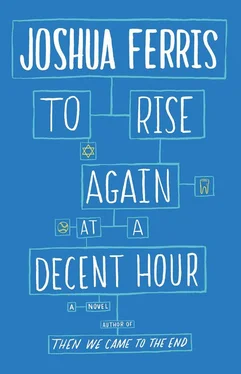I turned.
“When you have a minute,” she said.
I had grown downright wary of Connie standing there with her iPad, preparing to show me God-knows-what new development, but at that moment, I was more relieved than when she had rescued me from telling Bernadette Marder that she was aging uncontrollably. I could stand and put some distance between me and Tommy and his inexplicably conjured stool.
“What is it now?”
She handed me the iPad. Twitter again:
There are levels of suppression that even this far along in history should not surprise anyone when they finally come to light
I looked up from the screen. “If you’re asking what suppression they’re talking about, Connie, I honestly have no idea. A massacre? A conspiracy? It could mean anything.”
“Not that one,” she said, pointing. “This one.”
Imagine a people so wretched that they envy the history of the Jews
“Oh,” I said.
“ ‘Imagine a people so wretched that they envy the history of the Jews’?” she said. She repeated it to indicate how little she understood what it meant and to appeal to me for guidance.
“How many times do I have to tell you?” I said. “That’s not me. I’m not the author.”
“Who are they talking about?”
“I don’t know.”
“Why bring up the Jews?”
“I don’t know.”
“Whose history is worse than ours?”
“I don’t know. I don’t know. I don’t know.”
She left. A few minutes later I followed her to the front desk.
“You’re not going to tell your uncle about this, are you?”
“My uncle?”
“Because I’m not sure he’d understand.”
“Which uncle?”
“Stuart,” I said. “Any of them, actually. But Stuart especially. I get the feeling he wouldn’t like it.”
“Like what?”
“That tweet. The tweet you just showed me. About imagining a people whose history is more wretched than the Jews’. I think it would bother him.”
“Why should that bother you? If it’s really not you doing the tweeting, who cares?”
“Because it’s in my name. What’s he going to think when he sees it’s in my name?”
“He’s going to think you wrote it.”
“Exactly.”
“But here’s the thing,” she said. “It seems a little weird that at one time you were obsessed with Jewish history, and next we know, on Twitter, someone with your name is making comparisons between his history and the history of the Jews.”
“First of all, I’m not sure I was ever ‘obsessed’ with Jewish history. And it’s not really ‘next we know’ because it’s been a while since I did any reading on Judaism.”
“Still a strange coincidence, is it not?”
“It is what it is,” I said. “I have no control over it either way.”
“And then for you to come up and ask me not to tell my uncle about it, when telling my uncle never even crossed my mind, that’s a little weird, Paul.”
“You know,” I said, “when we’re at work, it would really be best if we all called me Dr. O’Rourke.”
“Why are you changing the subject?”
“I’m not changing the subject. I’m responding to something you said.”
“Why don’t you want my uncle Stuart to know about that tweet?”
“Because your uncle Stuart already thinks I’m an anti-Semite. Is he more likely to believe that someone is impersonating me, or that I’ve gone off the deep end again?”
“When did you go off the deep end?” she asked.
I went back to finish up with Tommy.
“What is an Ulm?” I wrote.
And can you stop tweeting in my name? Connie’s starting to think it might actually be me.
Who’s Connie?
“Connie’s my office manager,” I replied. Then immediately wrote again:
What do you mean, “Who’s Connie?” You know who Connie is. No one called her an “office manager” until you came along and made that website. She’s not an office manager. All she really does is write out appointment cards after scheduling new appointments.
Why did I even send that? Before I knew it, I was writing back a third time.
That’s not true. I sat in my waiting room recently and watched her work. It turns out she does a lot around here. At any moment she could be juggling ten different things. When I saw her the other day, I realized that she deserves a lot of credit for keeping things running smoothly.
I quickly regretted hitting SEND. What was wrong with me? I didn’t owe him an explanation.
Have you told her any of that?
No.
No! “No” was one word too many.
Don’t you think you should?
Probably.
Then why don’t you? You’ve noticed something. That’s a huge success, Paul. Daily awareness is our biggest challenge. But it will come to nothing unless you share it with her. It is forgivable to say nothing out of ignorance; it’s inexcusable to remain silent once awareness dawns.
Connie came into the room as I was reading. As casually as possible, I returned my me-machine to my pocket.
“Who are you always emailing?” she asked.
“I’m not emailing,” I said. “I’m reading about last night’s game.”
I removed the me-machine from my pocket and pretended to carry on reading about last night’s game. She didn’t move.
“They didn’t play last night,” she said.
I looked up. “Who didn’t?”
“The Red Sox,” she said. “They were off last night.”
“I’m not talking about the Red Sox,” I said. “I’m talking about a different team.”
“What team?”
“What does it matter, what team? The Yankees.”
“The Yankees were rained out last night,” she said. “Fifth inning.”
“That doesn’t mean there was no analysis of those five innings,” I said. I shook my head in dismay at the ignorance of non — sports fans.
“The Yankees weren’t rained out last night,” she said. “They played Chicago and won eighteen to seven.”
I left the room. I came back.
“By the way,” I said. “I’ve been meaning to tell you how much I appreciate everything you do around here. The billing, and breaking down all the UPS boxes. And getting the desk flowers,” I said. “The flowers really make a difference.”
She dimmed her eyes to fine crystal points, trying to discern my motive.
“Since when do you notice flowers?” she asked.
“That’s it,” I wrote.
I’m done talking to you.
My website changed the next day and now included cantonments 30–34 of the Cantaveticles. They picked up where the story had left off, with the fleeing of four hundred Amalekites to Mount Seir.
“And David King of the Israelites pursued the Remnant unto Mount Seir,” my bio page read, “and he slew of them in Seir all the children of the tribes of Amalek, all four hundred still living; not withstanding Agag, the king of the tribes of Amalek in every generation, for he hid himself behind the cypress tree, to witness all that Israel had done to the Amalekites, from Hazazon even to Seir. And Agag wept for Amalek, whose blood wetted the beds of dry stone, and compassed around him like the willows of the brook, and came down like a rain from heaven.”
On it went. Agag weeps until he has no more power to weep, whereupon he takes to cursing the God of the Israelites, whom he’d tried to win over in Hazor by basically subscribing to every tenet and custom his messenger boy managed to smuggle out of the Israelite campsite. “What hath thou wrought, ye God of Israel?” he cries in the thick of a lot of dead bodies and bloody camel remains. You picture something worse than Antietam, an undulant wave of body parts, torsos, heads of bloody hair starting to coagulate in the heat, in the middle of which the sole survivor of an exterminated people falls to his knees to curse a god he really thought might be God. “Did they not bow down before thee, and serve thee, and seek mercy in thy eye?” he asks. “And did they not keep all thy ordinances and statutes, and cease eating swine and coney, and circumcise themselves, and put on clean raiments? And did I not love thy daughter,” he asks, “and learn Hebrew for thee?”
Читать дальше












